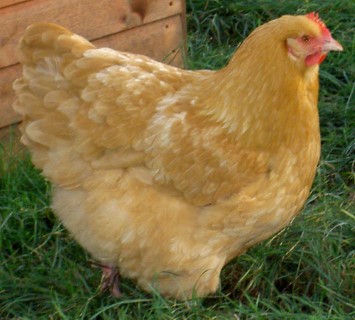Orpingtons are
all around great birds. They can lay up to 200 eggs in a year, are thick and
meaty birds for cooking, and are easily relaxed for showing. They tend to be a
good choice for any chicken enthusiast just getting into the hobby or for any
farmer needing a top-notch reliable chicken around the yard.
Orpingtons are
friendly and relaxed, so much so that they can be training to feed from the
hand. They are perfectly content in confinement, which goes along with why they
make such good show chickens. They're very active and like to explore, yet they
aren't too concerned when there isn't too much space to do so. They tend to
like each other and don't get into arguments or squabbles either.
Orpingtons are
huge and heavy with nice, squared bodies fit for both egg laying and meat
production. The loose feather that characterizes the breed accentuates its
broadness, culminating in a short but smooth sweep in the tail region.
Orpingtons stand very low, at times even so low that their bottom feathers
touch the ground. They have a single medium comb on their head with red
ear-lobes and eyes. The most common colors are black, buff, white, and blue
laced.
Orpingtons
don't require much extra attention other than a clean run with dry bedding as
their feathers will easily get wet and dirty from being so full and loose.
Regardless, they're too heavy to fly and don't have very long legs for their
body type, so a short fence is all that's really needed to keep them from
escaping. If, however, you want to keep their original coloring, it's best to
keep them out of the sun as much as possible, so adding plenty of shade along
their run is imperative, otherwise their coloring will start to fade.
